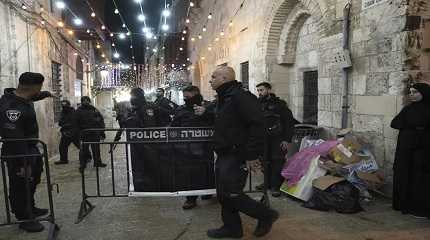
JERUSALEM (AP) — Israeli police shot and killed a man who they alleged tried to snatch an officer’s gun at an entrance to a Jerusalem holy site early Saturday, raising fears of further violence during a time of heightened tensions at the flashpoint compound.
The police said the slain man was 26-year-old Mohammed Alasibi from Hura, a Bedouin Arab village in southern Israel. Palestinian worshippers at the entrance to the site on Saturday morning had a different account, saying that police shot the man at least 10 times after he tried to prevent them from harassing a woman who was on her way to the holy compound.
Hours after the incident, the muddy stone alleyway leading to the compound was still stained with blood.
Authorities said that officers detained the man for questioning outside the sacred compound home to Al-Aqsa Mosque in the heart of Jerusalem’s Old City — the third holiest shrine in Islam. The compound, revered by Jews as the Temple Mount, is also the most sacred site in Judaism.
The city’s contested compound has been a focus for clashes in the past, particularly in times of turmoil in Israel and the West Bank. This year, as violence surges in the occupied territory under the most right-wing government in Israeli history, fears of an escalation in Jerusalem have mounted with the start of the Islamic holy month of Ramadan. Israeli police have boosted their forces in the area as tens of thousands of Muslim worshippers from Jerusalem and the West Bank gather for prayers at Al-Aqsa Mosque.
On Friday, more than 200,000 Palestinians gathered for noon prayers at the compound, which passed peacefully.
Just after midnight Saturday, police said Alasibi attacked one of the officers and grabbed his gun, managing to fire two bullets into the air as the officer struggled to restrain him. Police described the incident as an attempted terrorist attack and said they shot and killed him in self-defense.
But Palestinian worshippers milling around the compound on Saturday insisted that the man was not a terrorist. Noureddine, a 17-year-old who lived in the neighborhood and declined to give his last name for fear of reprisals, said he saw Alasibi confront police who had stopped a female worshipper on her way to Al-Aqsa Mosque. Alasibi’s relationship to the woman was not clear. He said some kind of disagreement broke out between Alasibi and the officers before he heard a dozen shots ring out.
“Nothing could justify that many shots,” he said, pointing to chaotic footage he filmed that showed Palestinian vendors and worshippers screaming at the sound of bullets being fired in rapid succession. “They were all at close range.”
Palestinian media widely reported that Alasibi was a doctor who had studied medicine recently in Romania.
Noureddine said police tried to force Palestinian vendors and worshippers out of the area after the incident, beating him and others with batons. Israeli police briefly closed the site before reopening it for dawn prayers.
Confrontations at the hilltop compound have triggered wider violence in the region in the past. Clashes at the site in May 2021 helped fuel the outbreak of a bloody 11-day war between Israel and Gaza Strip’s Hamas rulers.
This year’s convergence of Ramadan with the Jewish holiday of Passover could increase the possibility of friction as the Old City hosts a large influx of pilgrims.
Early on Saturday, residents of the Old City shared videos of Israeli police entering the Al-Aqsa Mosque compound to remove a banner belonging to the Islamic militant group Hamas hanging over the shrine that called worshippers to confront right-wing Jews who were planning to tour the compound on Sunday.
Settlers in the Old City, and devout Jewish Israelis, have visited the Temple Mount in rising numbers in recent years. Under a long-standing agreement known as the status quo, Jews are allowed to visit but not pray at the site. Any small perceived change to the status quo at the site can trigger violence.
For the past year, Israeli-Palestinian fighting has surged in the occupied West Bank. At least 86 Palestinians have been killed by Israeli or settler gunfire this year, according to an Associated Press tally. Palestinian attacks against Israelis have killed 15 people in the same period. Israel says most of those killed have been militants. But stone-throwing youths protesting police incursions and people not involved in the confrontations have also been killed.




